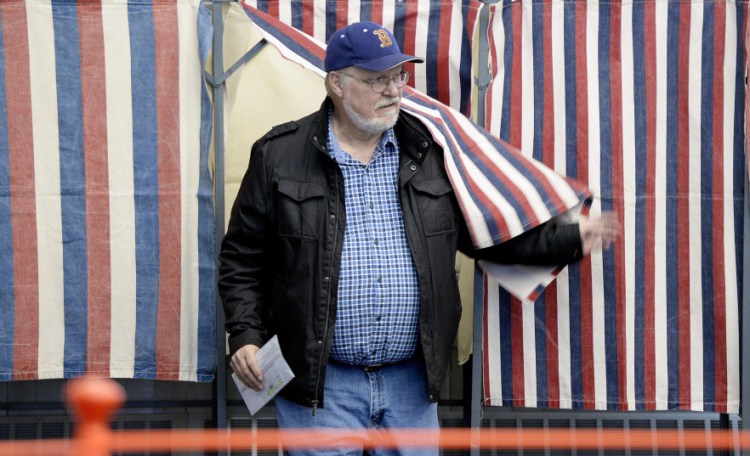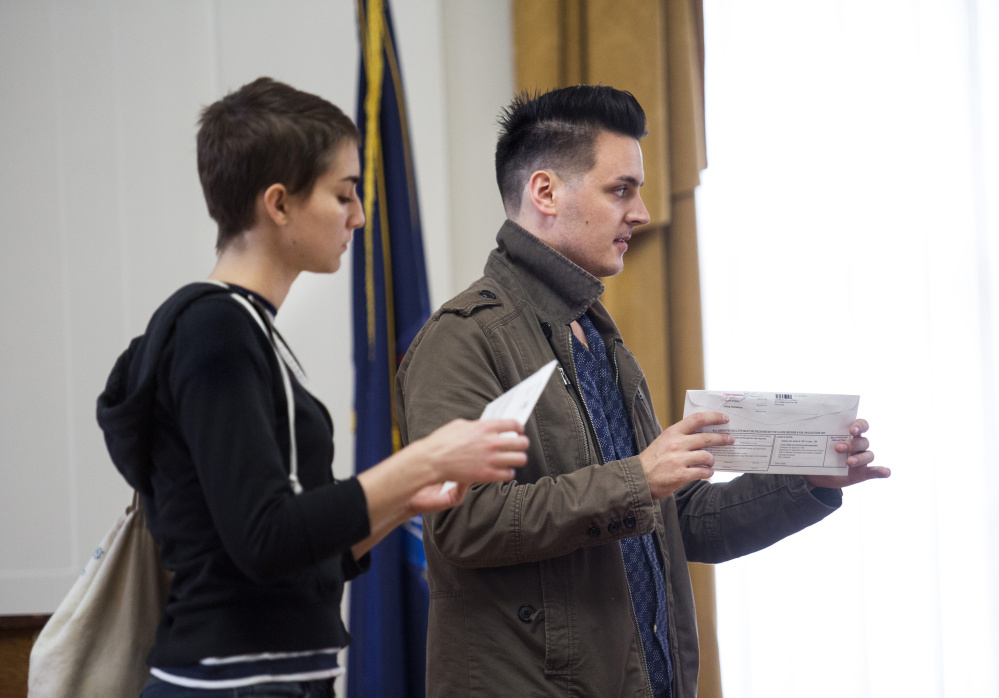Gov. Paul LePage called Maine’s voting process into question Tuesday, saying that elections – which twice have put him in the governor’s mansion – aren’t “clean” because voters don’t have to show identification at the polls.
Maine Secretary of State Matthew Dunlap rejected that contention, saying voter fraud is practically unheard of in the state. He said Maine has a system designed to detect voter fraud, including electronically counted paper ballots, which provide a backup to ensure that tallies reflect the actual votes.
“I’m not confident of a clean election in Maine,” LePage said in an interview on WVOM radio, sidestepping a comment by the show’s hosts, Ric Tyler and George Hale, that he was twice elected governor under the same election system he was questioning – and also elected mayor of Waterville twice. “The Democrat Party insists on not having IDs. Will people from the cemetery be voting? Yes.”
LePage said Democrats have stymied his efforts to change the election laws. He called for voter ID cards to ensure that only properly registered voters are casting ballots.
LePage’s remarks come as Republican presidential candidate Donald Trump is insisting that the election is “rigged” and voter fraud is widespread, an assertion that has been found to be untrue.
President Obama also weighed in on the issue Tuesday, saying Trump should “stop whining.” Trump’s complaints, Obama said, “are based on no facts” and are intended to discredit the elections.
Maine Democrats suggested that LePage was preparing for an electoral defeat of Trump, whom the governor has endorsed.
“What kind of Election Day results is the governor anticipating and making excuses for?” asked state Rep. Sara Gideon, assistant House majority leader. “Why didn’t we hear these kinds of accusations about the integrity of our election system when he was twice elected governor? It’s just another day in the LePage administration, making excuses and laying the blame on everyone but himself and his party’s presidential candidate.”
STATE TRACKS BALLOTS CAST
During his radio appearance, LePage said the state should issue free photo ID cards for voters to guarantee “a free election.” In Maine, voters are required to provide identification when they register to vote, but do not have to show ID when casting a ballot.
The governor said Democrats want everyone to vote, “whether they’re citizens or not.” He said there were some counties in the country where more people vote than there are residents, but did not provide any details about where that might be occurring. The show’s hosts didn’t question his claim.
When asked to clarify his assertions, LePage would not comment further. His spokeswoman would not say whether the governor was advocating a new voter ID system or provide any information on his claim about voter turnout exceeding populations in some counties.
Dunlap said improperly cast votes are almost always the result of unintentional errors. Maine’s statewide master voter list is connected to databases maintained by the Social Security Administration, so that people who die are removed from the voter rolls. Another connection, with the state Bureau of Motor Vehicles, allows election officials to determine if a voter moves and changes a driver’s license to reflect a new address.
Dunlap said he knows of only two cases in his 10 years as the state’s top election official in which voters cast more than one ballot, and in both cases the acts were caught, deemed unintentional and didn’t lead to prosecution.
Intentionally voting twice is punishable by up to five years in jail and a $5,000 fine.
Dunlap also said the state’s system tracks absentee ballots that are sent out. If a ballot is filled out and mailed in, a notation is made in registration books to indicate that the person already has voted. If the absentee ballot isn’t mailed back, he said, the resident can vote on Election Day.
NO EVIDENCE OF WIDESPREAD FRAUD
Dunlap and other secretaries of state around the country, including Republicans, have pushed back against Trump’s allegations, noting that prosecutions for voter fraud are extremely rare and involve only a few handfuls of votes among hundreds of millions cast in recent years.
According to the fact-checking website Politifact, which rated Trump’s allegations of widespread voter fraud “pants on fire,” an investigation of voting irregularities found 31 credible incidents of voter fraud out of more than 1 billion votes cast from 2000 to 2014. Another investigation found 150 alleged cases of double voting, 56 cases of non-citizens voting and 10 cases of voter impersonation in all elections from 2009 to 2011. Most of the cases did not lead to charges.
In 2012, then-Maine Republican Party Chairman Charlie Webster alleged voting irregularities in the election that November, claiming without evidence that hundreds of unknown black people showed up in some rural towns to vote on Election Day.
“In some parts of rural Maine, there were dozens, dozens of black people who came in and voted,” Webster said. When questioned about his assertion he refused to provide details, and no proof was ever found that unknown people were voting fraudulently.
Trump has called on his supporters to go to polling places to watch for potential fraud, especially in “certain communities,” specifying urban centers such as Philadelphia or Chicago. Opponents have said Trump is essentially encouraging supporters to intimidate voters.
Maine has a law intended to discourage voter intimidation, adopted after a group videotaped voters at some polls who signed petitions to get a referendum question on the ballot requiring universal background checks on firearms sales. The videotaping occurred on Election Day in 2015 and the referendum question is on the ballot this year.
The law requires anyone videotaping voters to stay at least 15 feet away when doing so. In Portland, election workers will put tape on the floor of polling places indicating the legal distance if anyone decides to videotape voters this year.
Dunlap also noted that while people can choose to become poll watchers, there are rules at each polling place about where they must stand, and steps are taken to ensure no voters are intimidated while the process is observed. In most years, he said, poll watchers are party representatives who keep track of who isn’t voting so campaign workers can make contact and offer a ride to the polls.
CONCERN OVER DEPRESSING TURNOUT
Dunlap said the allegations of widespread voter fraud are distressing to election officials.
“It is frustrating for me,” he said. “Among secretaries of state, we’ve been very concerned about the rhetoric around the conduct of the election.”
The worry, he said, is that voters who believe the system can be manipulated might be discouraged from voting, suppressing turnout.
“The process works,” Dunlap said. Allegations to the contrary, “just by the sheer system that’s been created by the Legislature over many years, are completely unfounded.”
The National Association of Secretaries of State issued a statement Tuesday assuring voters that elections in America are “fairly administered and well-secured, with built-in structural safeguards to ensure honest outcomes and accurate results.”
The statement said the organization was concerned that “unsubstantiated claims” of election fraud could “shake voter confidence or disrupt voting.”
ELECTION OFFICIALS DEFEND PROCESS
Maine city clerks also defended the electoral process, saying their poll workers undergo hours of training to make sure voting goes smoothly and isn’t marred by fraud.
“I think Maine has an excellent system” for updating voter registration rolls, said Lisa Goodwin, the city clerk in Bangor.
She said that in addition to getting updates from the Social Security Administration on deaths and the Bureau of Motor Vehicles on residents changing their addresses on driver’s licenses, her staff checks city death records monthly to purge the rolls of residents who have died.
Trump has asked his supporters to become independent election monitors, and Goodwin said they’re welcome at her polling place at the Cross Insurance Center as long as they obey rules designed to protect voters from intimidation,
“As long as they’re not hindering our process,” she said. “There’s no fraud going on and it’s a bit insulting (to suggest that) to the election officials who work so hard and put in long hours to make sure things are done right.” As in Bangor, Portland poll workers get at least two hours of training before Election Day and have lots of experience, said Portland City Clerk Katherine Jones.
“Some of them have been doing this for 30 years,” she said, and the training goes toward making sure “we have a smooth and successful election.”
Send questions/comments to the editors.





Success. Please wait for the page to reload. If the page does not reload within 5 seconds, please refresh the page.
Enter your email and password to access comments.
Hi, to comment on stories you must . This profile is in addition to your subscription and website login.
Already have a commenting profile? .
Invalid username/password.
Please check your email to confirm and complete your registration.
Only subscribers are eligible to post comments. Please subscribe or login first for digital access. Here’s why.
Use the form below to reset your password. When you've submitted your account email, we will send an email with a reset code.